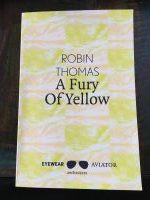 Poetry Space editor, Susan Jane Sims reviews A Fury of Yellow by Robin Thomas (Eyewear Aviator Series 2016)
Poetry Space editor, Susan Jane Sims reviews A Fury of Yellow by Robin Thomas (Eyewear Aviator Series 2016)
Every reader comes to any material with their own emotional legacy and so it was with me. I began reading this brightly coloured pamphlet collection sitting in a chair by the bedside of my dying son. I even read him a couple and they made him smile. This pamphlet handles well, with the waxy cover distinctive for this series by Eyewear, pleasing to the touch. The first thing I noticed on opening is the quotation by American poet Frank O’Hara who was well known for poetic meditations on his everyday life in New York, and for his love of art. Also for name dropping so I was already imagining a particular style and subject matter within.
Now for the poems and what stood out for me: It is the relationships explored and what is unsaid, it is Robin’s empathy for people, particularly those in the watching and waiting position. How could I not be drawn to Christ Taking Leave of his Mother (p.31) based on the 1520 painting by Wolf Huber. Robin describes grief as ‘suffusing [Mary’s] body/collapsing her face softening her bones.’ Pretty much a perfect description of the physical effects of grief. And the ending: ‘Only his hands are seen, blessing His Mother/as all men bless their mothers/as all men take leave of their mothers’ is coolly poignant. Traditionally it has always been men in the centre of the action, the women, waiting, watching, weeping. Yet Robin is not condoning this, merely observing. In Expedition (p.19) the extended fantasy style metaphor allows us to imagine without a true account, the incredibly hard life of one woman, presumably the poet’s own mother. The settings of day and night, split between stanzas add a dark, wry touch to the poem particularly the ending where the woman ‘reaches the summit with a great sigh/stares into the unfathomable dark.’ My favourite on the theme of women has to be Petticoat for Marie Jalowicz Simon (p,12), a Jewish survivor of WW2 who managed to evade capture by the Nazi regime. An incredible story, already told in memoir and beautifully evoked here in Robin’s economical language.
The other poems I want to mention in this brief look at a lovely collection, are the trio of pieces that make up Theme and Variations: An experiment on a Bird in the Air Pump – Joseph Wright of Derby, 1768. (pp 23 – 25) This is intriguing. I have not heard or read of this experiment and will research it more. The poems appear to take three angles, that of the bird in The White Cockatoo, the equipment in The Pump and a natural object in the distance, The Moon. I love the way, each consecutive piece appears to give us less yet in fact gives us more so that we are drawn from the cold experimental set up of a scientist, through to human cost. I can see Frank O’Hara in this set, possibly Wallace Stevens too; both American poets and both favourites of mine. Yet that is not to say, that Robin Thomas is not original or interesting. He is both. He has clearly used his logical, scientific way of thinking; his ability to dissect and deconstruct, to write in a way that is largely fresh and inspiring and allows us to glimpse his deep compassion for all of us flawed human beings.
Susan Jane Sims, February 7th, 2017.
Notes:
‘What will survive of us is love’. From An Arundel Tomb. Philip Larkin
Now available in Poetry Space Online Shop.







